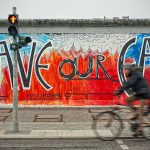For the members of the diplomatic corps in the GDR, life was completely different from that of the citizens of East or West Berlin. Ambassadors, embassy counsellors, embassy secretaries and attachés lived in a kind of parallel world
.
The special legal situation of diplomats protected them from persecution. And the diplomatic papers allowed them to cross the border into West Berlin (via Checkpoint Charlie) at any time. There was no shortage for them because they had access to the markets of the world. Fruit from all over the world, a car without years of waiting, everything was possible.
Ralph Morton had been Third Secretary for Internal Affairs at the British Embassy since 1987. His main responsibilities were the press and the church in the GDR. As there was no second secretary, his fields of activity were more extensive than normal.
The embassy was located in East Berlin at Unter den Linden 32-34, but officially it was only responsible for the GDR without East Berlin. The four-power status made this necessary. Hence “British Embassy to the GDR”, i.e. embassy “to” the GDR, not “in” the GDR. In practice, however, East Berlin was also “handled”. The consular powers were also arranged in such a way that no recognition of East Berlin’s belonging to the GDR could be read out. A French diplomat answered a question to this effect very cautiously: “As far as Berlin is concerned, I think you know who is in charge.”
A cautious approach was taken. It was a rule that GDR citizens were not granted asylum in Western embassies
Morton’s father had landed in Normandy in 1944 with the 79th Armoured Division and fought his way into Germany in his AVRE engineer tank. He had little use for Germans and so his marriage to a German was probably surprising even to himself. The couple lived in Oxford where he worked as an architect until his death. Ralph spoke little German at home, but the family often went on holiday to Germany.
He studied humanities and entered the diplomatic service. This was followed by service in various countries, including West Germany. As he had a number of friends in West Berlin, the transfer to East Berlin was almost a homecoming for him.
He arrived shortly before the 750th anniversary of Berlin. While citizens usually had to wait a long time for housing, the East Berlin administration (Service Office) provided flats for diplomats, in old or new buildings, as desired. Mr. Morton moved into a prefabricated building near Friedrichstraße. But unlike in houses for GDR citizens, the floors were divided differently. Instead of four to six flats, there were only two. He had a huge dining room, living room, several bedrooms, kitchen and bathroom. A small special feature in the diplomatic house was an alcove next to the front door, where a GDR guard always stood to check on visitors.
The cleaning lady was an East Berliner and reported to the State Security. And she didn’t just clean. That’s why a British exterminator often appeared in the flat. On the hunt for “bugs”. Surveillance was permanent, diplomats were always told about it by their embassies. On the West Berlin side of Friedrichstraße there was a telephone booth that was bugged again and again. Mobile phones were rare at that time and some diplomats were naïve and thought they could safely make confidential calls there.
Ralph Morton had no misconceptions about the GDR. When asked what he thought of it, he privately called it “cute”. Naturally, this provoked astonished reactions. An unjust state was cute? The GDR of the late 1980s reminded him of Monty Python or Chaplin’s The Great Dictator. A satire on the Federal Republic or a democratic state. But a state of injustice. Full of absurdities.
His job brought him close to the events that led to the end of the GDR. The ecclesiastical opposition in the GDR was usually viewed critically by diplomats from NATO countries because it represented an extreme form of the peace movement. Mr Morton attended their events on duty and was usually bored stiff. “Everyone was desperate to talk and few had anything to say”. As became apparent after the fall of communism, the church’s contacts with the state leadership were often closer than admitted.
Morton had many contacts with pastors and opposition figures and that is precisely why he has no illusions today about their role in the collapse of the GDR. Many wanted a different socialism, not an annexation to the Federal Republic.
A diplomatic tour of the GDR in 1988 was accompanied by much propaganda. The GDR was a peace state. The youth would be educated for peace and there would be no war toys. Of course he knew about the pre-military education in GDR schools. He used the next stop to visit a toy shop where he bought a FROG rocket launcher model. “This is a peace toy” was his comment as he passed it through the bus. The shops were full of war toys and he amassed a nice collection over the years in East Berlin.
The embassy had shop windows on Unter den Linden displaying British products and newspapers. There were always people’s policemen there to keep an eye on who showed too much interest. At times they even erected barriers. But since practically everyone in East Berlin used West Berlin media, this was simply senseless actionism. Almost everyone knew about Western advertising television.
The British press was poorly represented in East Berlin. Reuters had a correspondent living there, but the BBC representative lived in West Berlin. At the end of the 1980s, the Stasi took a cautious approach. Journalists were far less harassed than before. Great importance was attached to avoiding bad press. So Ralph Morton’s tasks in this area were easy.
The long prepared celebrations for the anniversary of the GDR on 7 October 1989 failed to have the effect the government had hoped for. It fell into disarray. The large demonstrations in October 89 remained peaceful, the measures planned by the GDR leadership failed to materialise because the hardliners could not find a majority. 4 November 1989 brought up to 500,000 people to East Berlin’s Alexanderplatz. The People’s Police and the NVA did nothing to stop them.
But no diplomat got the wrong idea. It was Mikhail Gorbachev who was responsible. By withdrawing support from the SED, he decided the course of events. If the Russians had intervened, the peaceful revolution would have turned into a bloodbath. And the Western Allies would have stood by and watched. No one was prepared to risk a world war for the citizens of the GDR.
As a diplomat, Morton had no problems with the border guards for a long time. That only changed after the fall of the Berlin Wall. Obviously, some of the border guards suffered under the new situation. After 9 November, breakthroughs were created in many places, including one not far from Checkpoint Charlie. The checkpoint itself remained open only to the same groups that had been allowed to use it before the Wende.
So when he and a West Berlin friend wanted to go to his East Berlin flat together, they went to the new breakthrough. Crowds of people walked peacefully in both directions. Germans from East and West, Turks, Vietnamese and people from many other countries. On the west side there was a single policeman who smiled at everyone and didn’t waste a glance at the papers.
On the east side, a signpost had been erected and border guards looked sternly at the people. People simply held up their identity cards and were waved through. The German friend went ahead, then Morton. “HALT” The border guard, probably slightly confused, waved the diplomat out. He explained to him that as a diplomat he was privileged and therefore only allowed to use Checkpoint Charlie. Suddenly the diplomat did not understand German. The West Berlin policeman had a fit of laughter and it took the border guard a few minutes to realise that he was about to produce an international incident. He asked, and received an order over the radio. Growling, he let the diplomat pass.
When they arrived at the house, they were in for a surprise. The alcove was empty, the guards had disappeared forever.



